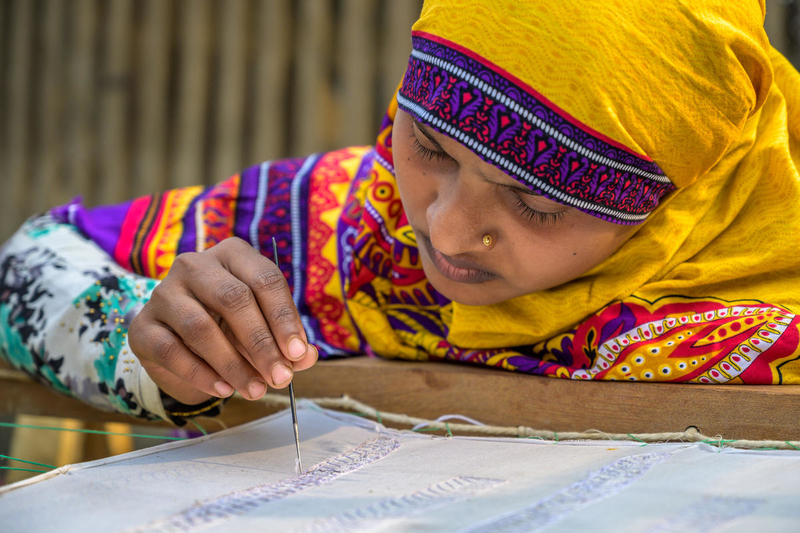Bangladesh has made great progress in poverty reduction, economic growth, and improvements around maternal and neonatal health. But that growth doesn’t always translate into economic gains across both genders.
In Bangladesh, only 4 percent of women participate in economic activities outside the home, compared to 70 percent of men. National average data from the Bangladesh Demographic Health Survey in 2014 indicated that for 13.1 percent of women, the husband controlled their cash earnings.
To make things even more difficult for struggling families, in southwest Bangladesh frequent natural disasters and rising soil salinity make agricultural work difficult and limit other available job opportunities.

That’s why Nobo Jatra, a five-year food security and development program implemented by World Vision and funded by U.S. foreign assistance, is helping skilled women find ways to help support their families and feed their children.
“We did an assessment to find out what alternative jobs would work in this area,” says Saeqah Kabir, Knowledge Management and Communications Manager for Nobo Jatra at World Vision Bangladesh. “We tried to identify small to medium businesses, then we facilitate to put small businesses and women together. Then we make sure it is all working.”
Four moms in Bangladesh learn embroidery to help their kids
It’s certainly working for four mothers in Baraikhali village. Shabnaj Begum, Urmi Akter, Kuntula Dhali, and Laboni Begum received training in hand embroidery and were connected with a local merchant by Nobo Jatra. Now they all earn additional income for their families through their beautiful embroidery work.

“It’s flexible,” says Shabnaj. “We can do it at the same time as our housework and on our own time.”
Their families are thriving under the new arrangement: The industrious moms use their earnings — about $18 per month — to pay for nutritious food and medical care for their children.
“This is the first time in our life we are getting money in our hands and utilizing it,” says Urmi. Her husband is a day laborer on someone else’s land — a seasonal job. “We are feeling very happy. Sometimes I can buy clothes for my baby. I can even give a gift to my husband.”
Urmi hopes to keep working and eventually expand her business. Her goal is to buy some cows and establish a farm, so she and her husband can work on their own land.

Aminur Rahman is the local merchant these moms are working with. He and his wife take orders from clothing shops in the capital city, Dhaka. Since Nobo Jatra began connecting them with talented local mothers, his monthly income has nearly doubled.
“The quality is improving day by day,” he says. “The buyers are eager to place more orders.”
About 500 beneficiaries of Nobo Jatra contribute to Aminur’s business and he couldn’t be prouder: “Through this work, it’s not only contributing to my income, but I can also help the poorest women. I’m contributing to the community.”

The name Nobo Jatra translates to “new beginning,” which is exactly what this alternative livelihood has given families in southwest Bangladesh.
“The Nobo Jatra project is trying to improve the livelihoods of the poorest,” says Urmi. “Through different activities, Nobo Jatra is trying to change our lives.”
Learn how World Vision and Nobo Jatra are helping girls say “No” to child marriage.
ACT NOW: Support programs that help empower women and girls in Bangladesh!
Foreign assistance — for about 1 percent of the total U.S. budget — supports programs like Nobo Jatra that empower women, promote health and nutrition, and help communities lift themselves out of poverty. Your voice helps these programs continue for moms like Shabnaj, Urmi, Kuntula, and Laboni!
Top photo: Urmi Akter meticulously threads beautiful embroidery to earn additional income for her family. (©2019 World Vision/photo by Jon Warren)



3 Comments